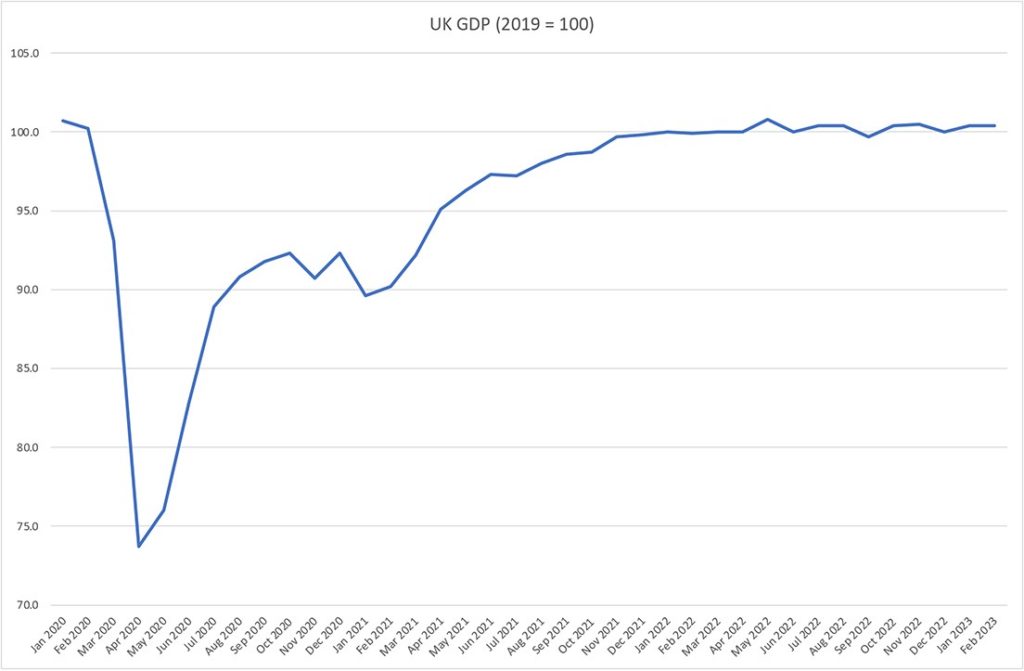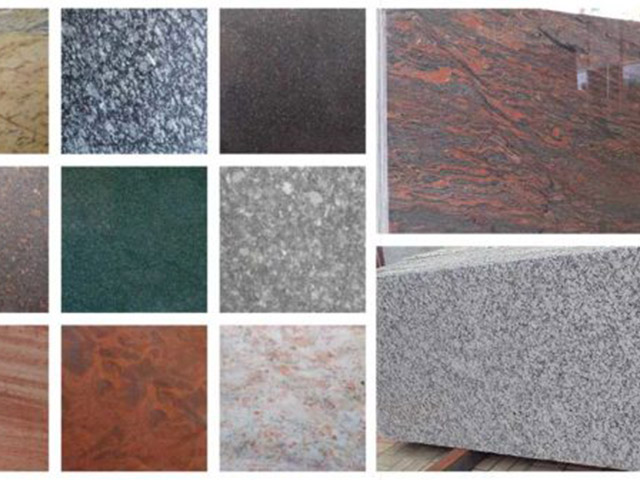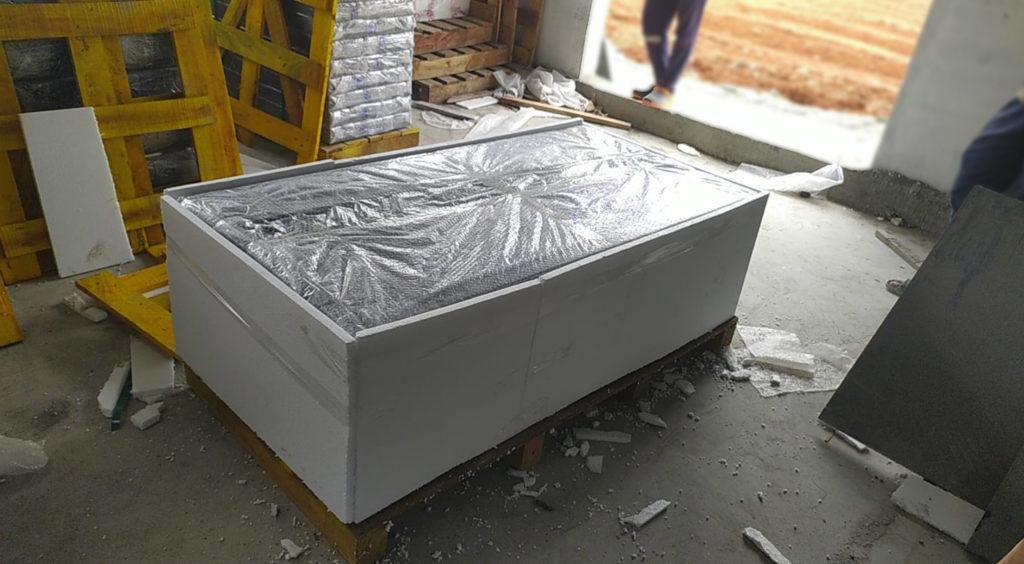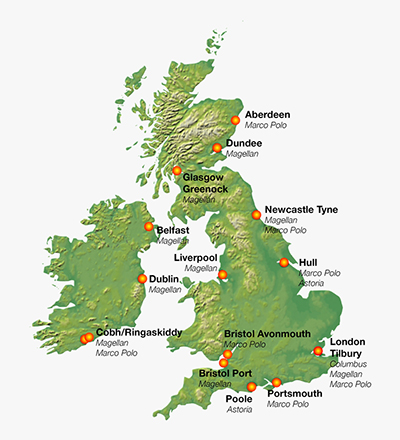Blog
Looking to import granite from India to UK? Here is how to do that.
Granite stone has carved a special niche in the field of construction thanks to its natural sturdiness, beauty, and durability. From outdoors to indoors, walls to floors, bathrooms to bedrooms, residential or commercial, granite has been making ways into every facet of architecture these days. In a country like UK where natural stones always get an edge over its counterparts, the import of granite is on the rise.
Be it natural stone wholesalers, suppliers, importers, construction companies, builders, and architects, they always look for superior quality granite for usage. Though granite can be sourced from different parts of the world, Indian granite is known to be both beautiful and sturdy. If you are looking to import granite from India to the UK, you need to be aware of the entire process to get the best outcomes. So, let’s find out how to do that.

Why granite is so popular in the UK?
Granite is a popular choice for various applications in the United Kingdom, particularly in construction and home improvement projects. Its popularity is mainly due to its durability, versatility, and aesthetic appeal.
The popularity of granite in the UK can vary based on trends, regional preferences, and individual choices. It’s a premium material, so its usage might be more common in higher-end construction and renovation projects. Additionally, the popularity of specific materials can evolve as new trends emerge and consumer preferences change. Here are some common uses of granite in the UK:
- Countertops and Worktops: Granite is a popular material for kitchen countertops and bathroom vanities. It is known for its durability, resistance to heat, and attractive appearance.
- Flooring: Granite tiles or slabs are often used for flooring in residential and commercial buildings. The hard and dense nature of granite makes it suitable for high-traffic areas.
- Monuments and Memorials: Granite is commonly used in the construction of monuments and memorials due to its durability and ability to withstand outdoor conditions.
- Building Facades: Granite is used in exterior cladding for buildings, providing a durable and visually appealing finish.
- Paving: Granite paving stones are used for outdoor areas such as driveways, walkways, and patios. They are durable and resistant to weathering.
- Decoration and Ornamentation: Granite is often used for decorative elements in homes and public spaces, such as fireplace surrounds, statues, and ornamental features.
- Sculptures: Sculptors and artists use granite for creating sculptures due to its hardness and ability to hold intricate details.
Indian Granite in the UK
The exports of granite from India to UK has grown substantially over the past few years. According to the latest statistics, the import worth of processed granites was roughly $24 million, marbles $23 million and ceramics $283 million in the second quarter of 2022. China and India are the top exporters of granite stone from Asia to the UK.
The government’s actions prevented the lockdowns in 2020 from having disastrous consequences, but the quantitative easing program’s money printing to stimulate the economy resulted in inflation reaching over 10% in the first half of 2023. Starting in December 2021, the Bank of England responded to this by raising interest rates one after the other. The base rate was 4.5% in June 2023, and more rises seemed expected. The budgetary policy of the government has also maintained high taxes.

According to Revenue & Customs’ data, derived from tax returns, indicates that the impact of Covid and Brexit has been negligible in the long-term growth of stone, despite the fact that stone companies reported some of the heat leaving the market at the end of 2022 and the beginning of 2023 as the cost of living crisis started to bite.
Because a major portion of the stone entering the UK in 2020 originated from China and India and was already at sea when the pandemic’s severity became evident, the overall volume of stone entering the country did not decrease. It had to arrive in the UK, which caused importers to wonder where to keep it, since sales in the UK stopped for almost a month until the government made clear that social distancing could still be used to continue operating.
How to import granite from India to the UK?
There are a few measures that one must remember while importing into the UK. Some of these responsibilities may be selected by your goods forwarder or customs broker if they are employed by you.
Be advised that further steps must be taken in the nation of origin, such as disclosing exported goods to regional businesses where your supplier is based. Once you’ve chosen a provider, you’ll need to get professional help because they vary depending on the area.
However, there are a few things you’ll need to complete on the UK’s end of the import procedure, such as:
- Applying for an EORI number only takes three working days, and receiving one will not take longer.
- Find the appropriate commodity code for your goods; this might include requesting a BTI decision. It usually takes some time, so allow enough time for it.
- Verify if you need to get an import licence for your items and submit an application if necessary.
- Make plans for transport logistics, which are usually carried out by experts in road, sea, or air haulage.
- Declare your items to customs, or assign this duty to a goods forwarder or customs broker.
- Pay any required taxes or fees before the goods are released from customs officials.
- Depending on the imported goods, it could be possible to later claim all or a portion of the VAT paid.

Essential Requirements That Need To Be Met While Importing Granite From India to the UK
Depending on whether you are importing items from within the UK or from outside, there are certain differences in the regulations for importing goods in the UK. This table should help to shed some light on the situation.
| REQUIREMENT | EU | NON EU |
| Commodity Codes | Yes | Yes |
| VAT Applicable | Yes | Yes |
| Import License | usually isn’t required | For restricted items |
| EORI | May be needed | Yes |
| Declaration | No | Yes |
| Duty applicable | No | Yes |
Commodity Codes
Internationally acknowledged reference numbers are known as commodity codes. When importing or exporting products, a code is used to describe a particular product. This code may be found in the Trade Tariff tool and should be used on any import declaration.
As it turns out, you’ll need to determine the appropriate commodity code for any items you import or export:
- The potential advantageous rates for import VAT
- Taxes
- And customs duty

VAT
When importing products from outside the European Union, the applicable VAT rate is the dominant UK rate, currently 20%, for the bulk of the items. However, for some items, like artwork, you can be eligible for a lower VAT rate. You could also be able to receive a VAT reduction or even full VAT exemption on the imports if you wish to export comparable goods once more within two years.
Import License
An import licence would be necessary for any import into the UK from outside the EU. Licences are normally only required in specific situations inside the EU, such as when transporting live animals or commodities that are considered hazardous or deemed harmful.
EORI
Economic Operator Registration and Identification is referred to as EORI. An EORI Number is required for every individual or business engaged in importation or exportation inside the European Union. If your company is VAT registered, you may even have an EORI number on file already, since they are occasionally produced automatically at the time of VAT registration. If not, an EORI number can be applied for online and issued within a few days.
Duty
Whether or not you have to pay duty will mostly depend on where your items were produced. Import duties must be paid on goods that enter the EU from outside.

Import Statements
It is necessary to submit an import declaration to the customs office when bringing goods into the country from outside the EU. SAD, or Single Administrative Document, also known as C88 in the UK, is the main document used for this purpose.
Top ports in the UK where granite imports are done
There are several sea ports all across the UK that receive the containers full of granite from different parts of the world. According to various sources, Indian granite one of the most preferred options for construction companies in the UK. Since granite is a heavy material, it can only be sent through shipping lines. Here we have highlighted all the major ports in the UK.
- Port of Felixstowe
- Port of Southampton
- Port of London
- Port of Immingham
- Port of Liverpool

The Conclusion
If you are interested in importing granite from India to the UK, you need to keep in mind the aforementioned elements before starting the journey. Since Indian granite is considered the best in the world and there are numerous granite exporters in India, it is always a good idea to choose from the top granite suppliers in India and browse through a wide assortment of granite slabs, countertops, tiles, custom articles and others.
